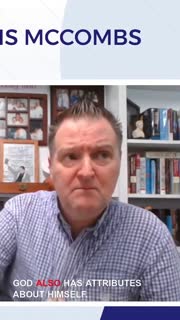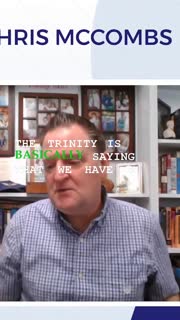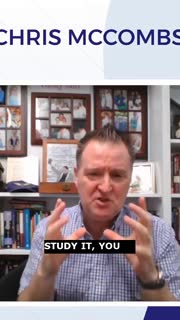Understanding the Mystery of the Trinity
Devotional
Sermon Summary
Bible Study Guide
Sermon Clips
### Quotes for outreach
1. "So if you want to know who God is, you have to dive into the Trinity. And you'll never fully know and understand it. But it's one of those things you have to put every aspect, of who you are emotionally, physically, mentally, spiritually, into can I understand and grasp this concept that we call the Trinity." [06:04] (24 seconds)
2. "God also has attributes about himself. For example, God can be your refuge. God can be your strength. God can be your savior. God can be your friend. There's different roles or attributes that God may have. But that is not. God, that's not like his nature. Right? So the hypostasis nature of God is he's divine." [07:11] (32 seconds)
3. "I think when you become a Christian, you kind of just don't think about it. You kind of just laugh. There's the Father. There's the Son. There's the Spirit. But at some point when we're quiet within ourselves, we need to really delve into this. So point one is, God is three in one. From Genesis to Revelation, the Bible portrays that." [12:41] (18 seconds)
4. "In the beginning was Jesus, and Jesus was with God, and Jesus is God. So when you look at that, and you look at that text, it's telling us that Jesus, the Word, the Logos, has always existed. He is not just with God, He is God. And He's always been. And so John is making this clear that we fully understand the deity of Christ." [14:40] (31 seconds)
5. "Hey, have a great day. Keep delving into that. Keep your faith strong. Keep praying to the Father. Keep praying through the Son. And keep believing and knowing that the Holy Spirit is at work in your life. Hey, God bless you. Have a great day. Remember these two realities. God loves you. So do I. We'll see you later. God bless." [20:18] (15 seconds)
### Quotes for members
1. "The Trinity is basically saying that we have a monotheistic God, but he presents himself in three persons, the Father, the Son, and the Holy Spirit. Now, that sounds like the Trinity is three and unity. So we have this tri-three concept. But yet unified into oneness. So in any type of logical math, that makes no sense. It doesn't. So we acknowledge the mystery of the Trinity. We need to. And the profoundness of it, it perplexes us." [06:04] (37 seconds)
2. "The Trinity is something we can't understand. When we try to comprehend it in our mind, we can lean towards things that I taught you Sunday, which is modalism, where we try to say, okay, well, God is the Father, and He's the Son, and He's the Spirit. Okay, I get that. But He can't be all those things at once. And there we get into, we try to put Him in a role, or we try to put Him in a mode." [09:35] (23 seconds)
3. "So, looking at this a little bit more, I went into some examples of things that maybe we're like, as humans, we want to understand this. We want to have it all figured out. And I know some of you out there that way. I can be that way too at times. I want to understand this. And this is just one of those things I don't know that we'll ever fully understand. Maybe in heaven we will. Maybe when we're completely known, and we completely know God, maybe in that moment we'll have it all figured out." [11:09] (32 seconds)
4. "So this triangle, you could write God in the middle and that's them. But you have the Father, the Son, and the Spirit all doing their thing. And so in Genesis 1.26, then God said, Let us make man in our own image according to our likeness. There's no way you can get around the plural of this text. And God is not schizophrenic. God is not bipolar. God is not divided within himself. He is one." [16:29] (37 seconds)
5. "I think as you study it, you should come to have a little bit greater concept that God does give it out as evidence of the Spirit in the Old Testament, of the pre-incarnate Christ, and of God the Father, Jehovah Yahweh himself in the Scriptures in the Old Testament. And then they fully get manifested at a greater level in the New Testament and help us form our theology that we call the Trinity." [19:22] (25 seconds)
Ask a question about this sermon
1. "So if you want to know who God is, you have to dive into the Trinity. And you'll never fully know and understand it. But it's one of those things you have to put every aspect, of who you are emotionally, physically, mentally, spiritually, into can I understand and grasp this concept that we call the Trinity." [06:04] (24 seconds)
2. "God also has attributes about himself. For example, God can be your refuge. God can be your strength. God can be your savior. God can be your friend. There's different roles or attributes that God may have. But that is not. God, that's not like his nature. Right? So the hypostasis nature of God is he's divine." [07:11] (32 seconds)
3. "I think when you become a Christian, you kind of just don't think about it. You kind of just laugh. There's the Father. There's the Son. There's the Spirit. But at some point when we're quiet within ourselves, we need to really delve into this. So point one is, God is three in one. From Genesis to Revelation, the Bible portrays that." [12:41] (18 seconds)
4. "In the beginning was Jesus, and Jesus was with God, and Jesus is God. So when you look at that, and you look at that text, it's telling us that Jesus, the Word, the Logos, has always existed. He is not just with God, He is God. And He's always been. And so John is making this clear that we fully understand the deity of Christ." [14:40] (31 seconds)
5. "Hey, have a great day. Keep delving into that. Keep your faith strong. Keep praying to the Father. Keep praying through the Son. And keep believing and knowing that the Holy Spirit is at work in your life. Hey, God bless you. Have a great day. Remember these two realities. God loves you. So do I. We'll see you later. God bless." [20:18] (15 seconds)
### Quotes for members
1. "The Trinity is basically saying that we have a monotheistic God, but he presents himself in three persons, the Father, the Son, and the Holy Spirit. Now, that sounds like the Trinity is three and unity. So we have this tri-three concept. But yet unified into oneness. So in any type of logical math, that makes no sense. It doesn't. So we acknowledge the mystery of the Trinity. We need to. And the profoundness of it, it perplexes us." [06:04] (37 seconds)
2. "The Trinity is something we can't understand. When we try to comprehend it in our mind, we can lean towards things that I taught you Sunday, which is modalism, where we try to say, okay, well, God is the Father, and He's the Son, and He's the Spirit. Okay, I get that. But He can't be all those things at once. And there we get into, we try to put Him in a role, or we try to put Him in a mode." [09:35] (23 seconds)
3. "So, looking at this a little bit more, I went into some examples of things that maybe we're like, as humans, we want to understand this. We want to have it all figured out. And I know some of you out there that way. I can be that way too at times. I want to understand this. And this is just one of those things I don't know that we'll ever fully understand. Maybe in heaven we will. Maybe when we're completely known, and we completely know God, maybe in that moment we'll have it all figured out." [11:09] (32 seconds)
4. "So this triangle, you could write God in the middle and that's them. But you have the Father, the Son, and the Spirit all doing their thing. And so in Genesis 1.26, then God said, Let us make man in our own image according to our likeness. There's no way you can get around the plural of this text. And God is not schizophrenic. God is not bipolar. God is not divided within himself. He is one." [16:29] (37 seconds)
5. "I think as you study it, you should come to have a little bit greater concept that God does give it out as evidence of the Spirit in the Old Testament, of the pre-incarnate Christ, and of God the Father, Jehovah Yahweh himself in the Scriptures in the Old Testament. And then they fully get manifested at a greater level in the New Testament and help us form our theology that we call the Trinity." [19:22] (25 seconds)










